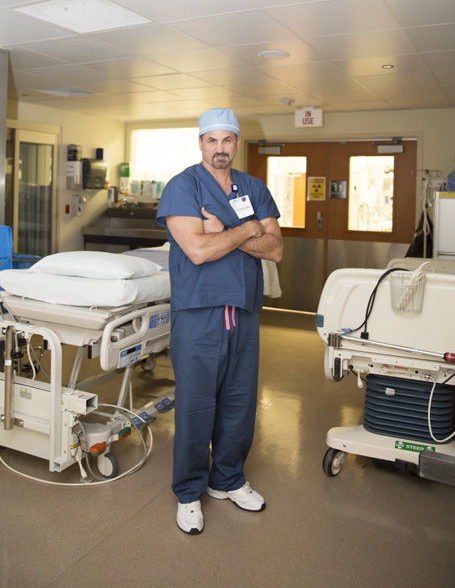
Todd Bibens isn’t a doctor. He doesn’t wield a scalpel and he doesn’t sew surgical sutures.
Still, over the past 11 months, Bibens has played a vital role in almost 7,000 successful surgical procedures here in Vero Beach.
As director of surgical services for Indian River Medical Center, Bibens’ job is to stitch together the many varied elements of the operating room and make everything run as smooth as surgical silk.
That task includes budgetary elements, time and personnel management and team-building, along with developing effective communications procedures for a widely diverse workforce.
Becker’s Hospital Review describes the successful director of surgical services as someone who “can go toe-to-toe with surgeons on important issues, then turn around and work with the staff who mops the [operating room] floor. They can respond to the needs of nurses, techs and the central sterile staff.”
Merck Manuals adds that people in Bibens’ position must also be constantly aware of updates and changes to the guidelines issued by the American College of Surgeons and its National Surgical Quality Improvement Program.
That might sound like a tall order for someone who describes himself as “a nurse by background,” but Bibens brings a bit more to the table than his nursing skills.
A former assistant vice president of emergency and critical care at Mount Sinai Medical Center in Miami, Bibens also spent 11 years as the director of clinical nursing and surgical services at Cape Canaveral Hospital in Cocoa Beach. The University of Central Florida grad and Air Force veteran also boasts an MBA as well as an MS degree in health services administration.
The financial responsibilities Bibens faces can be daunting. “There are just so many supplies and so many moving parts,” he explains, that the already heavy expense of surgery can quickly get out of control. But if pressed, he will admit that keeping all the lines of communication open is his biggest challenge.
“Setting clear expectations for any group that you speak to as to what you need them to do or would like them to do” is absolutely essential, he says.
“Clear, direct communication with timely feedback is the key,” Bibens continues, and to that end he adds, “We have monthly meetings with all our staff members to update them on expectations and to give them updates on new information. We also have huddles daily, Monday through Friday, to update people on what’s going on.”
And while most people tend to shy away from using the adage that “time is money” when it comes to medical care in general and surgery in particular, one of Bibens’ missions is to save time which, he says, can save lives as well as money.
Specifically he points to the turnover times in the operating rooms.
By having the whole team – including cleanup or environmental care staff members, nurses, operating room technicians, anesthesia technicians and surgeons – ready to roll as soon as a room becomes available, Bibens estimates they save three minutes between each operation.
Three measly minutes may not sound like much but if you multiply those three minutes by 30 or 40 surgical procedures a day, that’s up to two hours’ worth of time, which “means now you’re not rushing. You’re not running down the hallway. You are just being more efficient with the time you have and the people you have already assigned.”
The last thing any patient on an operating room table wants is for someone involved in their surgical procedure to rush through the job and forget to do something vital.
And, plainly put, the surgical business at IRMC is booming these days.
“We have a very big rate of growth in surgical procedures here, which is exciting,” Bibens says. “I’m very happy to be part of that. I’ve been in places where it goes the other way and that’s much worse.”
He adds, “We’ve been able to absorb the [increased] volume we have now and we can take on more volume. Again, efficiency is what allows us to do that.”
Using efficient practices, clear and open communication systems, teamwork and experience as his scalpels and forceps, Bibens’ goal is to continue to cut time and trim costs where he can while still improving patient safety as he enters his second full year as the director of surgical services at IRMC.



